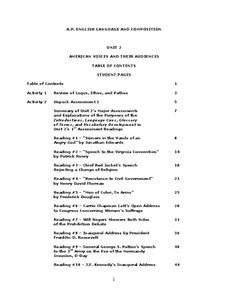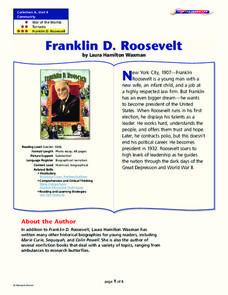Carolina K-12
The Major Conferences of World War II
Young historians create a 1940's news radio broadcast on the five major World War II conferences, including the Atlantic, Casablanca, Tehran, Yalta, and Potsdam.
A&E Television
The World Wars
Contemporaneously known as The Great War, World War I had never seen its match on the global stage—until World War II. An engaging set of resources designed to extend a viewing of the History Channel's The World Wars features discussion...
Smithsonian Institution
Mobilizing Children
Scholars find out how the government used propaganda to mobilize children to help in the war effort. Lesson exercises include analyzing a quote from Franklin Roosevelt, viewing propaganda images and posters, and participating in a lively...
PBS
Universal Declaration of Human Rights
What rights are guaranteed to students? Do they align with the Universal Declaration of Human Rights, which was approved by the United Nations in 1948? Middle and high schoolers present persuasive arguments about the rights they believe...
PBS
Master of the Airwaves: How FDR Used Radio to Ease the Public’s Fears
The political and economic climate during the 1930's was uncertain and tumultuous. But Americans' minds and hearts were eased with the reassuring words of their president, Franklin D. Roosevelt, and addresses over the radio. High...
American Battle Monuments Commission
World War II: A Visual History
Explore the enormity of World War II, including its causes, prominent battles, and historical figures, with an interactive map and timeline. Divided into each year from 1939 to 1945, as well as sections pre- and post-war, the resource...
Northshore School District
American Voices and Their Audiences
Those new to teaching an AP level language and composition prep course and seasoned veterans will find much to treasure in a unit that is designed to help young language scholars develop the skills they need to analyze the language...
Constitutional Rights Foundation
U.S. Immigration Policy and Hitler’s Holocaust
Though the Statue of Liberty welcomes political refugees to her shores, the welcoming sentiment has not always been reflected in the American citizenry. High schoolers read about the regrettable period in United States history when the...
Humanities Texas
Primary Source Worksheet: Citizen Letters to President and Mrs. Roosevelt Concerning the Depression
A letter addressed to President Roosevelt and another addressed to Eleanor Roosevelt offer insight not only into these two amazing historical figures, but also into the struggles people faced during the Great Depression.
Humanities Texas
Primary Source Worksheet: Franklin D. Roosevelt, First Inaugural Address
Young historians will learn not to fear primary source materials (or fear itself, for that matter) thanks to this resource that uses Franklin D. Roosevelt's March 4, 1933 Inaugural Address to model how to conduct a close reading of such...
Humanities Texas
Primary Source Worksheet: Franklin D. Roosevelt, Excerpts from Fireside Chat on Economic Conditions
Franklin D. Roosevelt's April 14, 1938 Fireside Chat on economic conditions provides young historians an opportunity to polish their primary source comprehension skills. A great resource to add to you curriculum library.
Humanities Texas
Primary Source Worksheet: John T. McCutcheon, “A Wise Economist Asks a Question”
No joke! Kids learn how to read political cartoons using McCutcheon's drawing as a starting point and then progressing to other images found online.
Utah Education Network (UEN)
Classical Appeals and War Speeches
Discuss classical appeals of rhetoric through the speeches of Winston Churchill and FDR. Learners read, annotate, and analyze the speeches by the men before using a graphic organizer to track the use of ethos, pathos, and logos.
Curated OER
The Crash and The New Deal
How did the stock market crash in 1929 when everything seemed to be going so well in the 1920s? Analyze the economic choices of the times that caused the crash and the Great Depressions occur. Hard hitting economics and the policies of...
Curated OER
Franklin D. Roosevelt
Discuss the life of Franklin D. Roosevelt. This story, called "Franklin D. Roosevelt" by Laura Hamilton Waxman, is used to explore comprehension skills. Some of these skills include identifying prefixes and suffixes, making comparisons,...
Carolina K-12
F.D.R. and the New Deal
Discover how President Franklin D. Roosevelt sought to alleviate the hardships of the Great Depression by analyzing the words of his inaugural address and exploring the various New Deal programs he would later implement.
Franklin D. Roosevelt Presidential Library & Museum
Civic Holiday Work Sheets
Everyone loves a day off, be it a national or statutory holiday or a civic holiday. The final resource in a 10-part civics series features 14 worksheets of the type given to young visitors at the Franklin D. Roosevelt Library and Museum....
Franklin D. Roosevelt Presidential Library & Museum
Pearl Harbor Activity #7: Pop Up Video Activity
A pop-up video version of FDR's "Day of Infamy" speech engages scholars in depending their understanding of the attack on Pearl Harbor. After watching the video, class members select five new things that they learned and research how...
Franklin D. Roosevelt Presidential Library & Museum
Pearl Harbor Activity #6: December 7 and September 11 - Infamy Twins?
Why did attackers on December 7, 1941, and on September 11, 2001, choose the targets they did? That is one of several questions young historians try to answer as they compare and contrast the two attacks. They also consider the...
Franklin D. Roosevelt Presidential Library & Museum
Pearl Harbor Activity #5: The Medium Matters
Young journalists learn that how we get our news and information matters in a collaborative social studies activity. The class is divided into three groups with the first analyzing a transcript of FDR's "Day of Infamy" speech, the second...
Franklin D. Roosevelt Presidential Library & Museum
Pearl Harbor Activity #4: Who is the Audience?
Young historians use the prompts on a worksheet to analyze President Roosevelt's "Day of Infamy" speech. They identify the intended audience for the speech, the devices FDR used to persuade his audience, the responses promoted, and the...
Franklin D. Roosevelt Presidential Library & Museum
Pearl Harbor Activity #3: Public Opinion Word Cloud
As part of a study of the December 7, 1941 attack on Pearl Harbor, young historians imagine the feelings of those who lived during the attack by creating a word cloud of 10 words they think express the emotions of people at that time....
Franklin D. Roosevelt Presidential Library & Museum
Pearl Harbor Activity #2: Why Do Words Matter?
Words matter! That's the big idea behind an activity that asks scholars to replace words in FDR's "Day of Infamy" speech with synonyms. They then listen to a recording of President Roosevelt's address and compare his version to their own.
Franklin D. Roosevelt Presidential Library & Museum
Pearl Harbor Activity #1: Newspaper or Radio Account
After listening to President Franklin D. Roosevelt's "Day of Infamy" speech, young historians research information about the Japanese attack on Pearl Harbor, possible motives for the attack, and the consequences of the attack. Scholars...

























